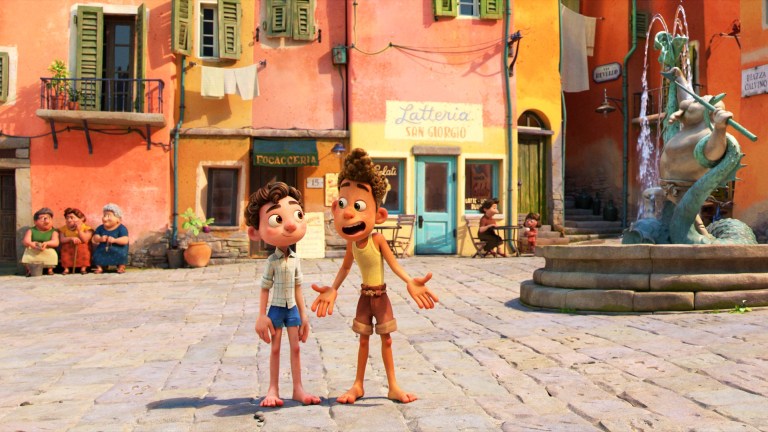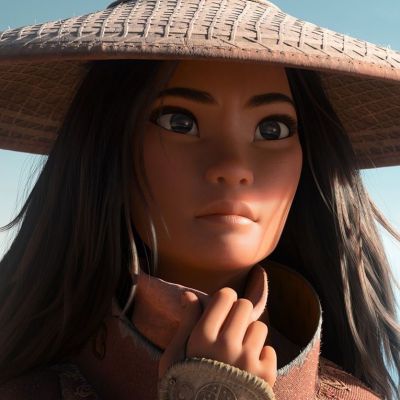How Luca Became the First Pixar Movie Made at Home
The director and producer of the new Pixar movie Luca had to get creative with making a movie during a pandemic.

Luca is the name of the next animated feature film from Disney’s Pixar Animation Studios, directed and conceived by animator and artist Enrico Casarosa. Working at Pixar since 2002 as a story artist in films like Cars, Up, Coco, and Ratatouille, Casarosa directed the 2012 short La Luna before making his feature directorial debut this year with Luca—an original fantasy based partially on Casarosa’s boyhood in Genoa, Italy.
Telling the tale of two teenage sea monsters named Luca and Alberto (voiced respectively by Jacob Tremblay from Good Boys and Room, and Jack Dylan Grazer of It and Shazam! fame) who spend a summer disguised as humans and enjoying life on land in an Italian seaside village, Luca represents two major firsts for Pixar: It is the first feature in the studio’s decades-long history to take place specifically in Italy and it is, for all intents and purposes, the first Pixar film to be made almost completely at home.
While the research, development, and production of the average Pixar film takes anywhere from four to seven years, the bulk of the animation and actual production, including voice work, happens during the last year before it is readied for release. With Luca set to arrive in 2021, this meant that Casarosa, producer Andrea Warren, and their extensive team of animators, artists and visual effects craftspeople would spend the majority of 2020 working on the film.
And that was the plan—until the pandemic hit and completely changed the way that the filmmakers would go about making their movie.
“I always joke that when we left our offices with our computers and papers in hand, I had a plant on my desk and I was like, ‘Should I take it?’” says Warren when Den of Geek speaks with her and Casarosa via Zoom. “[I had] zero idea of what the road ahead was going to be like. I think very quickly it was all about lifting barriers. Like, can we animate from home? Can we meet? Can we record actors? Slowly we answered ‘yes’ to all of those things. We realized we would actually get to continue making the film.”
With the Pixar campus in Emeryville, California effectively shut down by the spread of the deadly coronavirus, the Luca team found themselves all trying to get their bearings and continue their work while isolating at home during the pandemic’s peak months.
“I think that one of the hardest things for sure was just communication,” says Warren. “I think we learned very quickly how much we got done walking down the halls in between meetings, running into people at lunch… there are all these things that kept so much of the communication and momentum of the project going. Trying to do that from home is a heavier lift, as is staying connected even as everybody’s lives sort of collapsed into one pile of parenting and kids and school.”
Warren adds that other non-work struggles—such as the initial difficulty of doing once simple things like buying groceries, or evading the threat of California’s annual wildfires—added to the tests heaped upon the filmmakers.
“There were just so many phases of this that were challenging,” she explains. “I think the biggest challenge was to keep the team connected and clear, on the same path and on the same mission. But there were some interesting advantages that we learned too. It certainly makes you rethink everything. More people could attend certain things because you could just Zoom in. We worked with a writer in New Zealand for a little while that we would’ve probably never worked with because we thought, well, you can’t go anywhere, anyway.”
Casarosa notes that even when it came down to recording the voices for the film, some of those sessions took place as far away as Italy itself—a sharp difference from the usual Pixar method of recording everything at the studio’s facilities. Casarosa adds that overall, making the movie this way was less about any new advances in the technology but finding new ways to use the existing resources in a new environment.
“There are a few tools that we have to go and tweak and enable the control,” the director says. “But it’s a little bit more about how we use them. For the style of our animation, for example, we didn’t have to reinvent the wheel. We just had to add a few possibilities and options and abilities, but I think it was really more like challenging ourselves to find different timings and vibes and energy.”
Citing a specific example, Casarosa continues, “We really had to learn how to record people from their homes. We thought that would be a problem. We thought that would be a huge loss in quality, but actually there’s enough technology that can clean it up. So that did not turn out to be a huge problem. But there were amusing things, like spending an hour with Maya Rudolph trying to figure out her iPad and not acting, but actually doing our own IT remotely.”
He adds, “But we realized—and it’s kind of amazing—that with an iPad and a microphone, and a little bit of work, you can do what we do at a state-of-the-art place like Pixar. That was really quite a journey, even if it was a little bit slower. Sometimes it felt like we were racing against the clock to be able to finish the movie… but now we know we can do this.”
Although it is a fable about friendship, told from the perspective of sea creatures who can shapeshift into human form while on dry land, much of Luca is immersed deeply in the natural beauty of the Italian Riviera and the rich culture and longstanding history of the small, sun-washed towns that nestle upon its shores and the hills. It’s somehow appropriate then that a film made under conditions of isolation, separation, and stress aims to transport viewers to an almost mythical yet still real slice of Italy.
“Even just the setting, we’re hoping, is wonderful,” says Warren when asked about releasing the movie into a world that’s tentatively emerging again. “That beautiful sense of getting to go somewhere that we all have been missing so much. We hope that it feels like being transported to this beautiful place that you would love to visit for real, but that you can visit through Luca. I think that’s one piece of it, that we’re hoping just to transport people out of our homes to feel like we went somewhere.”
Luca premieres exclusively on Disney+ on June 18.


